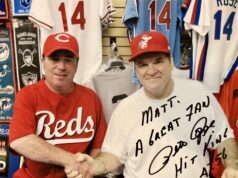by Todd Piccirilli
The Never Ending Story
On the one hand, this year’s primaries are over. On the other, we still have over five months of campaigning to endure. For the most part the various races have been relatively tame with the one exception of the democratic fight for the U.S. Senate. Does this mean that we can actually look forward to the races as they make their way into the home stretch?
Not likely, but we can keep our fingers crossed. However, at least two issues have been raised during these primaries that are likely to have ramifications well beyond the November elections.
First, with Charlie Owen as the primary catalyst, the bid for the U.S. Senate has added fuel to the fire in the debate over campaign financing. As Americans witness this ever-growing trend to spend a mediocre athlete’s salary on a campaign, it won’t be long before only the wealthiest citizens even consider running for a major office. Somewhere Ross Perot is drooling on his millions in anticipation of the 2000 Presidential race.
Perhaps a more interesting issued raised during these primaries is that of endorsements. Typically, candidates look forward to winning endorsements from newspapers and various groups and organizations that could carry some influence with the voters. However, there’s another side to the endorsement game. Recently, Charlie Owen and Chris Gorman, a candidate for the 3rd Congressional District seat, received endorsements from Freedom’s Heritage Forum, which was created by anti-abortion and anti-gay rights activist Frank Simon. While the thinking behind the endorsements is something of a mystery and both candidates disavowed them, it didn’t take long for these candidates’ opponents to use the endorsements against them. Talk about turning the tables on exploiting endorsements.
City and State Duke It Out
The dispute over the building of the new Mary G. Copeland Home has escalated into a court battle as the state requested a temporary restraining order against Lexington. The shelter, which will house 36 abused and neglected children, seeks to bypass local zoning laws by building on state land. The city argues, however, that the use of state land does not imply absolute immunity from local regulations.
After neighbors in the Briar Hill Road area voiced their concerns earlier this spring about the development of an urban use facility in their regulated rural sector, a planning commission decided that the shelter could be built as long as it didn’t exceed rural size limits. But the Copeland Home is planning on a 17,000 square-foot center, 7,000 more square feet than the maximum limit. As a result, city building inspectors halted construction earlier this month.
Unfortunately, this “size does matter” quarrel may be only the tip of the iceberg as the Briar Hill Neighborhood Association plans to file a lawsuit against the state. Whatever the final outcome, Reverend Lovejoy’s wife, Helen, can somewhere be heard making her zealous plea of “Would somebody please think of the children?”
The Once and Future King
In other lawsuit news, several local farmers and agricultural groups are taking on the federal government in an attempt to allow the cultivation of industrial hemp on U.S. soil. As the future of tobacco grows more uncertain each day, several Kentucky farmers see industrial hemp as the wave of the future.
At one time Kentucky’s agricultural economy thrived on industrial hemp as a major cash crop. Now, support for the plant is coming from numerous arenas. Not only do farmers see it as a potential economic boon, but many others argue that it is a valuable resource in the efforts to protect our environment. This is mainly evident in the various paper products that can be fashioned from hemp rather than trees that are at the heart of the many environmental debates concerning logging and deforestation.
Of course, industrial hemp suffers from being associated with its infamous sibling marijuana, the very reason why growing hemp is illegal. In recent years, though, Americans have demonstrated that a distinction between the two plants should be made. Hemp products, made from hemp grown outside the U.S., have become increasingly popular in this country with several stores, including one here in Lexington, specializing in hemp only products.
Already people in Lexington have the ability to buy an entire outfit made from hemp and then show it off at a local pub while sipping a hemp-based beer. With the lawsuit, local farmers are telling the government to give the home team a piece of this action.




